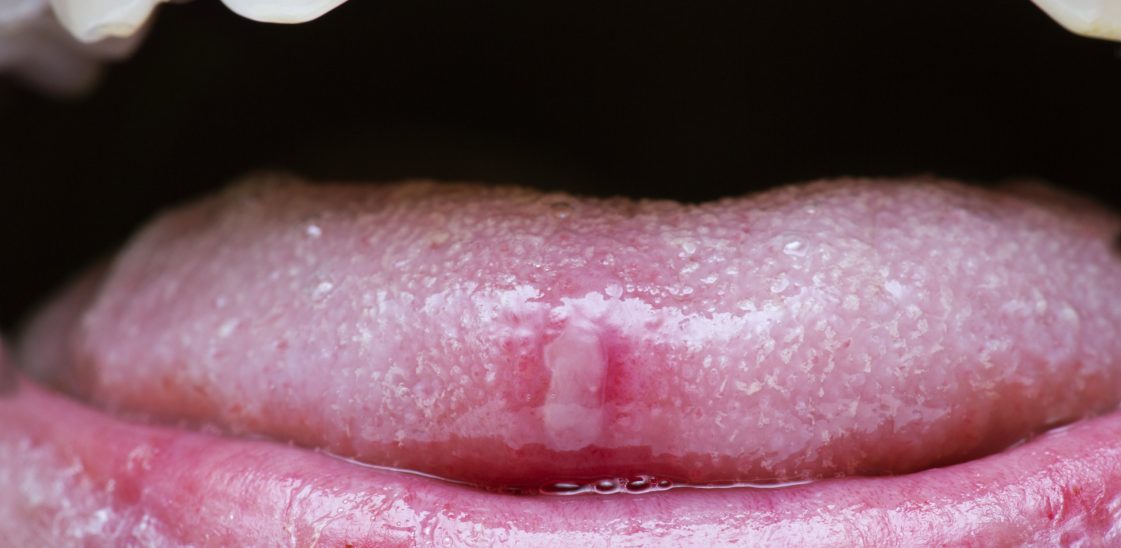
What is a canker sore?
A canker sore is a small, painful abscess found in the inside of your cheeks, your gums, or sometimes on your tongue. They are sometimes referred to as mouth ulcers. Though they aren’t usually anything to worry about, you should speak to a doctor or dentist if a single ulcer lasts longer than three weeks.[1]
Canker sore symptoms
Canker sores are easily recognisable, although you may have to use a mirror to be able to comfortably see them due to their location. Usually, they will be round white or grey patches with a red outline. They can sometimes appear yellowish. The ulcers may change in size and shape over time, and you can have more than one at a time.
It’s important to know the difference between a canker sore and a cold sore. Cold sores are usually found outside of the mouth – around the lips and chin, for example – and are contagious, whereas canker sores are found inside the mouth and are not contagious.[1]
What causes canker sores?
A number of things can cause canker sores, but the most common cause is damage to the inside of your mouth. This can happen if you:
• Bite your cheek or tongue
• Get a cut or abrasion from something hard like a crisp or a set of braces
• Burn your mouth on a hot drink or meal
• Feel anxious or stressed
• Irritate your cheeks and gums with a hard-bristled toothbrush
Sometimes they can be caused by other things, such as:
• Hormonal changes e.g. during pregnancy
• An iron or vitamin B12 deficiency
• Some medicines
• Stopping smoking
You may even find your genes are involved – some families tend to get mouth ulcers more often than others.[1]
How long do canker sores last?
Canker sores should stop being painful after a few days, and disappear altogether within two weeks. However, there is a risk that they can ‘reopen’ if you damage the area again in that time. If this happens, be prepared for them to last a little longer and try to avoid further damage.
Mouth ulcers that last for longer than three weeks without reason may be a cause for concern. They may be a sign of something more serious. If you’re worried about a canker sore, ask your doctor or dentist for advice.[1]
How to get rid of canker sores
Canker sores usually go away on their own without the need for medication. Avoiding triggers might help to speed up the process, as well as keeping the pain manageable and reducing the likelihood of further ulcers. You may find it easier to drink through a straw until the sore stops hurting.
However, if the pain is affecting your speech, eating, or drinking, you may want to consider taking some pain relief. A pharmacist will be able to recommend the best option for you from a range of treatments designed to help with mouth ulcers. Some of these may also speed up healing and prevent infection.
Another option to soothe the pain without having to go to the pharmacy is to use a saline mouthwash. Simply dissolve some salt in warm – not boiling – water and swill it around your mouth before spitting it out. You can do this as many times as you like to ease the pain, but try not to swallow any – it can dehydrate you.[1]
How to prevent canker sores in your mouth
There is no hard and fast way to prevent mouth ulcers. Sometimes they can appear for no apparent reason. You can, however, reduce the likelihood of getting one by following the same steps you’d take to help one heal quickly – avoiding cuts, abrasions and burns wherever possible.[1]
A good oral hygiene routine can also help to prevent canker sores. Leftover bits of food can cause irritation in the mouth which may develop into an ulcer – so cleaning your teeth is essential. Don’t forget to get in between your teeth and/or braces using interdental brushes or floss picks, and always brush thoroughly for at least two minutes, twice a day.[2]
Resources:
[1] https://www.nhs.uk/conditions/mouth-ulcers/
[2] https://www.nhs.uk/live-well/healthy-teeth-and-gums/how-to-keep-your-teeth-clean/




